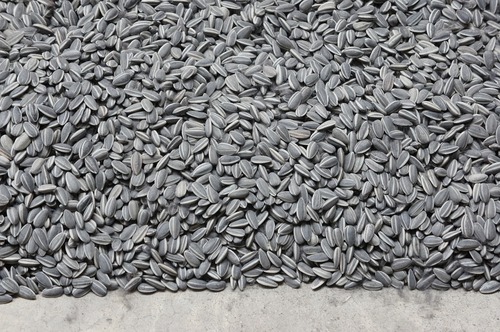Is Sunflower Oil Bad For You?
Short answer
No, sunflower oil is not bad for you. In fact, it’s relatively good for you—in moderation, sunflower oil has been shown to lower LDL cholesterol and it’s also an effective topical treatment for eczema and athlete’s foot.
Recommended Alternative
Overall beneficial to your health. Things rated a 'B' may have some harmful qualities to pay attention to.
View Full Grading System
Category 'A'
Very healthy and numerous health benefits. Side effects are rare. Things rated an 'A+' are typically necessary for survival (for example, water).
Very healthy and numerous health benefits. A few harmful qualities may be associated, but only under certain circumstances such as an allergic reaction.
Very healthy and numerous health benefits. Harmful qualities may be associated, but aren't usually serious.
It is important to note that even the best things in life can become bad in immoderate amounts. So, although something may be rated an 'A+', overconsumption/overdoing can bring unwanted effects.
Category 'B'
Very beneficial to your health. Things rated a 'B+' may have a few harmful qualities to pay attention to.
Overall beneficial to your health. Things rated a 'B' may have some harmful qualities to pay attention to.
More beneficial to your health than not. However, harmful qualities are most likely associated and shouldn't be overlooked.
The main difference between category 'A' and category 'B' is the harmful qualities typically present in 'B' items. Serious side effects are usually uncommon, but are still possible and should be taken note of.
Category 'C'
Both beneficial and harmful qualities associated. Things rated a 'C+' are typically a bit more on the beneficial side. Still, moderation is important.
A fairly even ratio of beneficial and harmful qualities. Moderation is important. Very general topics that can lean towards both sides of the spectrum will be placed here as well. Rice, for example, can be good or bad depending on the type.
More harmful than beneficial. Side effects are common, especially when consumed/done excessively. Moderation is very important.
Category 'C' usually denotes to both good and bad qualities. When it comes to this category, it is important to keep this word in mind: moderation.
Category 'D'
Harmful to your health. Although benefits may be associated, the bad most likely outweighs the good. Moderation is very important.
Harmful to your health. A few benefits may be associated, but the bad outweighs the good. Moderation is extremely important.
Harmful to your health. Very few, if any, benefits are present. Things in this category should be avoided as much as possible.
Category 'D' is typically for things that are more harmful than beneficial. While consuming/doing something unhealthy once in a blue moon shouldn't hurt, we definitely recommend eliminating 'D' items as a regular part of your routine/diet.
Category 'F'
Category 'F' is for things that fail to bring anything beneficial to the table, and are very harmful to your health. We recommend completely avoiding anything in this category. Long-term side effects of 'F' items are usually very serious.
Category 'N'
'N' stands for neutral. Things placed into this category are generally (a) neither good nor bad for you, or (b) lack the necessary evidence to reach any conclusions.
Long answer
In a world of “fat-free” food wrappers and “fat-blasting” nutritional supplements, it’s easy to forget that your body actually needs fat. The American Heart Association (AHA) recommends that healthy adults consume somewhere between 20 to 35 percent of their daily calories from fat. And not just any fat—the AHA specifically suggests that they come from fish, nuts, and vegetable oils.
Here’s why: selecting healthier sources of fat has been shown to reduce your risk for heart disease. Sunflower oil is a great substitute, as most of its fat content is unsaturated. In addition to being low in cholesterol and sodium, it’s also a very nutrient-dense food: sunflower oil contains vitamin E, a powerful antioxidant which helps boost your immune system and reduce your risk of heart disease.
Sunflower oil also has significant benefits when applied topically. Ozonated sunflower oil, specifically, has been shown to be just as effective in treating athlete’s foot as the tried-and-true anti-fungal ketoconazole. Other studies have suggested that the high-moisture properties of sunflower oil are beneficial in the treatment of eczema.
However, it is possible to have too much of a good thing... particularly for those who are already battling obesity, type 2 diabetes or high cholesterol. Sunflower oil contains essential fatty acids, which is great... but it’s important to note that it carries a much higher omega-6 content than most other vegetable oils. So if you eat too much sunflower oil, it can cause an imbalance of fatty acids within your body, which can lead to chronic, inflammatory conditions. Additionally, consuming too much sunflower oil may spike your body’s blood sugar and fasting insulin. If you have type 2 diabetes, this may increase your chances of developing hardened arteries.
So how can you safely enjoy the benefits of sunflower oil? First, you should consult your physician before adding the oil to your diet. Your health care provider will be able to screen you for conditions like obesity, high cholesterol, and type 2 diabetes so that they can warn you if sunflower oil is not appropriate for your diet. Second, if you are cleared to use sunflower oil, monitor your intake. Pay attention to how much omega-6 your body needs, and how much you’re taking in on a daily basis to avoid over-consumption.
Possible long-term side effects
- atherosclerosis (hardening of the arteries in those with type 2 diabetes
-
various inflammatory conditions (when overconsumed)
Ingredients to be aware of
Benefits
- decreased risk of heart disease
-
helps reduce cholesterol
-
boosts immune system
-
treats skin conditions (athlete’s foot, eczema)
Our Wellness Pick
(what is this?)
Organic Sunflower Oil
- High Oleic content
- Ideal for cooking
- Skin care friendly
- Non-GMO
- Pesticide/Chemical-free
Learn More!
Please turn your Ad Blocker off to see this content. Thank you!

 Approved by
Approved by 















